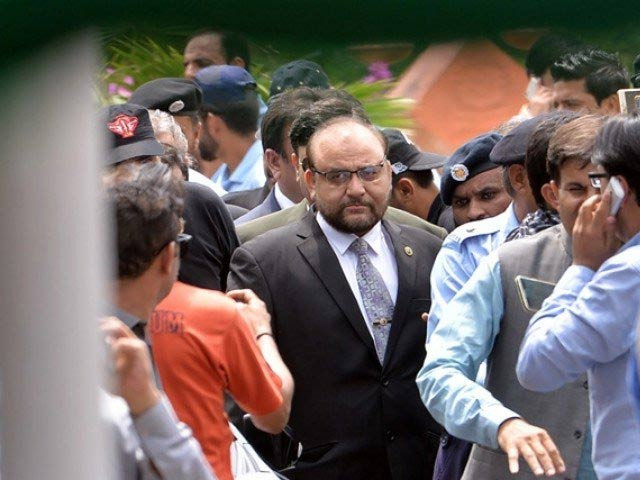Avenfield reference: Focus shifts to volume 10 of JIT report during Zia's cross-examination
All copies of volume ten are sealed by SC or by NAB

JIT Head Wajid Zia. PHOTO: FILE
Judge Muhammad Bashir directed the JIT head to file an application before the apex court and either obtain the relevant documents to fresh his memory or produce the confidential Volume 10 of the JIT report while answering defence counsels’ questions.
“Would you file an application to the Supreme Court, requesting to unseal Volume 10?” Harris questioned.
“Yes, I would,” Zia responded.
At this, Harris requested the court to direct the JIT head to file an application so that Volume 10 of the JIT report can be presented in court. The court allowed the request.
The hearing resumed in the Avenfield Apartments reference, with Harris questioning Zia on the Mutual Legal Assistance (MLA) sent by the JIT to the Central Authority, International Cooperation Department, Ministry of Justice, Dubai.
Sharif’s allegations baseless, says NAB
“Seven MLAs were sent to the department, four were sent together on a single date and the rest were sent on different dates,” Zia informed the court during Harris’ cross-questioning.
The defence then probed the JIT head on whether the MLAs were sent to anyone else, besides the Ministry of Justice, to which Zia replied in the negative.
Upon this, Harris stated, “What if I told you that you did send the MLAs pertaining to Tariq Shafi to someone else.”
At this, Zia said that he would have to confirm, as the information is sealed in Volume 10 of the JIT report.
“Do you know that a copy of Volume 10 was provided to NAB?” Harris asked.
“I don’t know,” Zia responded.
Harris then went on to ask Zia, “Who asked to seal Volume 10 of the JIT?”
Zia replied by saying that the JIT had requested the Supreme Court to seal it and all copies of Volume 10 were sealed by the apex court.
“I don’t think that Volume 10 was submitted in a sealed condition to the Supreme Court,” Zia said while answering a question.
Harris then went on to question whether a written application was sent to the Supreme Court to seal the report.
“It was a verbal request, and in an open court,” Zia responded.
“I recollect that five sets of Volume 10 were submitted to the Supreme Court, and they ordered it to be sealed. The JIT only had office copies of Volume 10 which are sealed by the JIT,” Zia further said in cross questioning.
Moreover, Zia admitted that the JIT did not collect any document to show that any amount was paid by Tariq Shafi to settle any outstanding liabilities after the sale of his 25 per cent shares of the Ahli Steel Mills, Zia admitted, while accepting that no statement of any witness or banker was recorded in this regard.
We shouldn’t be expected to respect decisions taken for vengeance: Maryam
He admitted that no document was received from Dubai to show that any outstanding amount was deposited by Tariq Shafi between 1978 and 1986.
He, however, added that no direct evidence came on record from any authority but the replies of the Mutual Legal Assistance came to the JIT.
Zia said the JIT did not investigate to whom the 25 per cent shares were sold and at what price.
In addition, Zia said, no witness said that the liabilities were paid from the sale of 25 per cent shares of the Ahli Steel Mills.
He, however, said that Shafi had told the JIT that the liabilities were paid.
To the questions if Shafi said that the liabilities were paid by selling his 25 per cent shares of the mill and did he say who and how the liabilities were paid, Zia said it was correct that Shafi only said that he did not know who had paid the liabilities and how.
He accepted that Shafi’s case was that he sold the 25 per cent shares of the Ahli Steel Mills, got AED 12 million in cash and handed it over to Qatari Royal Fahad Bin Jasim through his representatives in installments.
He conceded that the JIT did not collect any document, showing on which date the liabilities were paid in any bank and the JIT did not record statement of any witness in this regard during the investigation.
The court would now resume hearing on April 4.



















COMMENTS
Comments are moderated and generally will be posted if they are on-topic and not abusive.
For more information, please see our Comments FAQ